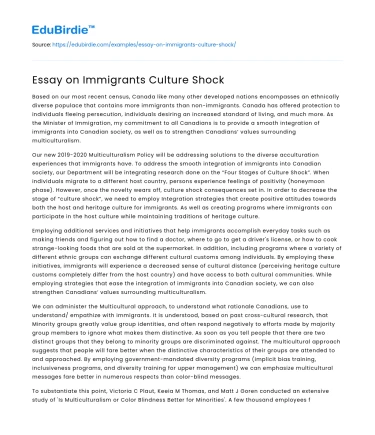Based on our most recent census, Canada like many other developed nations encompasses an ethnically diverse populace that contains more immigrants than non-immigrants. Canada has offered protection to individuals fleeing persecution, individuals desiring an increased standard of living, and much more. As the Minister of Immigration, my commitment to all Canadians is to provide a smooth integration of immigrants into Canadian society, as well as to strengthen Canadians’ values surrounding multiculturalism.
Our new 2019-2020 Multiculturalism Policy will be addressing solutions to the diverse acculturation experiences that immigrants have. To address the smooth integration of immigrants into Canadian society, our Department will be integrating research done on the “Four Stages of Culture Shock”. When individuals migrate to a different host country, persons experience feelings of positivity (honeymoon phase). However, once the novelty wears off, culture shock consequences set in. In order to decrease the stage of “culture shock”, we need to employ Integration strategies that create positive attitudes towards both the host and heritage culture for immigrants. As well as creating programs where immigrants can participate in the host culture while maintaining traditions of heritage culture.
Save your time!
We can take care of your essay
- Proper editing and formatting
- Free revision, title page, and bibliography
- Flexible prices and money-back guarantee
Employing additional services and initiatives that help immigrants accomplish everyday tasks such as making friends and figuring out how to find a doctor, where to go to get a driver's license, or how to cook strange-looking foods that are sold at the supermarket. In addition, including programs where a variety of different ethnic groups can exchange different cultural customs among individuals. By employing these initiatives, immigrants will experience a decreased sense of cultural distance (perceiving heritage culture customs completely differ from the host country) and have access to both cultural communities. While employing strategies that ease the integration of immigrants into Canadian society, we can also strengthen Canadians’ values surrounding multiculturalism.
We can administer the Multicultural approach, to understand what rationale Canadians, use to understand/ empathize with immigrants. It is understood, based on past cross-cultural research, that Minority groups greatly value group identities, and often respond negatively to efforts made by majority group members to ignore what makes them distinctive. As soon as you tell people that there are two distinct groups that they belong to minority groups are discriminated against. The multicultural approach suggests that people will fare better when the distinctive characteristics of their groups are attended to and approached. By employing government-mandated diversity programs (implicit bias training, inclusiveness programs, and diversity training for upper management) we can emphasize multicultural messages fare better in numerous respects than color-blind messages.
To substantiate this point, Victoria C Plaut, Keeia M Thomas, and Matt J Goren conducted an extensive study of 'Is Multiculturalism or Color Blindness Better for Minorities'. A few thousand employees from various companies were assessed on the relationship between each company's attitude toward diversity and their employee engagement with their work. The more multicultural and the less colour-blind the attitudes of the white employees, the more the minority employees were engaged with their work. Similarly, minority employees have more trust in and are comfortable with, a company that offers multicultural messages than with one that offers color-blind messages, especially when the company has only a few minority members. As the Minister of Immigration, my first and foremost commitment to Canadians is to understand that by protecting immigrants, we will grow to be an inclusive, prosperous, and safe country.






 Stuck on your essay?
Stuck on your essay?

